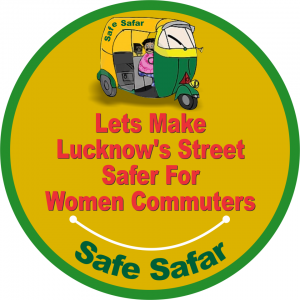Nov. 25 – Dec. 10 are the 16 Days of Activism Against Gender-Based Violence. To commemorate the week, we are featuring 1 activism idea per day. This information is excerpted from my new book Stop Global Street Harassment: Growing Activism Around the World (Praeger 2015).
Harassment on public transportation is a universal problem, and individuals and groups have organized awareness-raising campaigns by distributing literature, performing skits, and sponsoring anti-harassment ads in countries like Colombia, Myanmar, Sri Lanka, India, the United Kingdom, and the United States.
 In Bogota, Colombia, the Latin American Women and Habitat Network created a no-groping campaign on the bus system in 2011. They hung posters at every bus stop and station and gave bus drivers shirts with slogans against harassment. They also role-played sexual harassment scenarios on the bus. Women dressed as men performed scenes about groping and then asked passengers what they thought about the behaviour. ‘We generally get positive responses,” wrote group member Marisol Dalmazo in a post for Love Matters. “More and more, people think sexual harassment should be condemned, that this kind of behaviour mustn’t be tolerated.’”
In Bogota, Colombia, the Latin American Women and Habitat Network created a no-groping campaign on the bus system in 2011. They hung posters at every bus stop and station and gave bus drivers shirts with slogans against harassment. They also role-played sexual harassment scenarios on the bus. Women dressed as men performed scenes about groping and then asked passengers what they thought about the behaviour. ‘We generally get positive responses,” wrote group member Marisol Dalmazo in a post for Love Matters. “More and more, people think sexual harassment should be condemned, that this kind of behaviour mustn’t be tolerated.’”
Whistle for Help is a popular campaign that launched in Myanmar in 2012. Initially, 150 people came together each Tuesday morning for nine months to distribute whistles and pamphlets to women at eight busy bus stops in Yangon. The pamphlets informed women to blow the whistle when they experienced sexual harassment on the bus and advised them to help other women who blow the whistle. The whistle campaign was so popular that riders regularly asked for extra whistles to pass out to their friends and family, and the campaign expanded to other regions, including Burma.
 In Lucknow, India, a survey found that 97 percent of women were harassed while riding in auto-rickshaws, and most drivers stayed silent when it happened. Through a Safe Safar campaign launched in 2010 by Zeeshan Mohammad, a man in his 20s who worked on gender and youth issues, the auto-rickshaw drivers received sensitivity training and learned how they can play a proactive role in helping women feel safer. This not only included how to speak out when harassment happened, but they also received instructions to not play offensive music and to remove photos of scantily clad women from their vehicles. In its first four years, the program reached 2,000 auto-rickshaw drivers and has received recognition for its success.
In Lucknow, India, a survey found that 97 percent of women were harassed while riding in auto-rickshaws, and most drivers stayed silent when it happened. Through a Safe Safar campaign launched in 2010 by Zeeshan Mohammad, a man in his 20s who worked on gender and youth issues, the auto-rickshaw drivers received sensitivity training and learned how they can play a proactive role in helping women feel safer. This not only included how to speak out when harassment happened, but they also received instructions to not play offensive music and to remove photos of scantily clad women from their vehicles. In its first four years, the program reached 2,000 auto-rickshaw drivers and has received recognition for its success.
The flash mob approach has been used in a few countries. In Delhi, India, members of the Please Mend the Gap campaign took off their jackets to reveal bright-yellow shirts with anti-harassment messages and create a bright chain against harassment. Upset by a man who pressed his erection against her and ejaculated onto her while she rode the London Tube into work, Ellie Cosgrave returned to the subway line on International Women’s Day 2013, held up a sign explaining what had happened, and then danced. “I danced my protest, and it felt right … I was responding with my body in the exact place that my body was abused, and while I couldn’t sing or shout very loudly, I could dance loudly,” Cosgrave wrote in an article for the Guardian. Her protest was met with kindness and support from other passengers.
Volunteers with Chicago’s CTA: Courage campaign and Washington, D.C.’s SSH, Collective Action for Spaces (CASS), and Voices of Men role-played harassment scenarios on subway cars and showed how witnesses can intervene to help stop the harassment. In both cities the groups distributed anti-harassment literature and received support and encouragement.
Help fund our work in 2016, donate to our end-of-year giving campaign!
